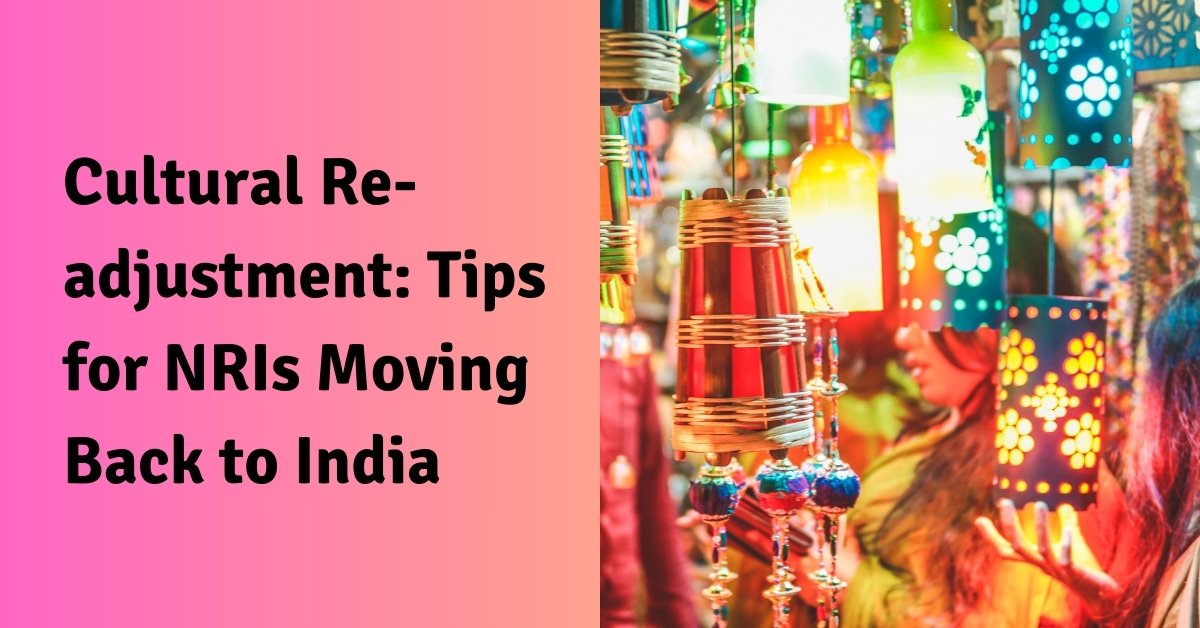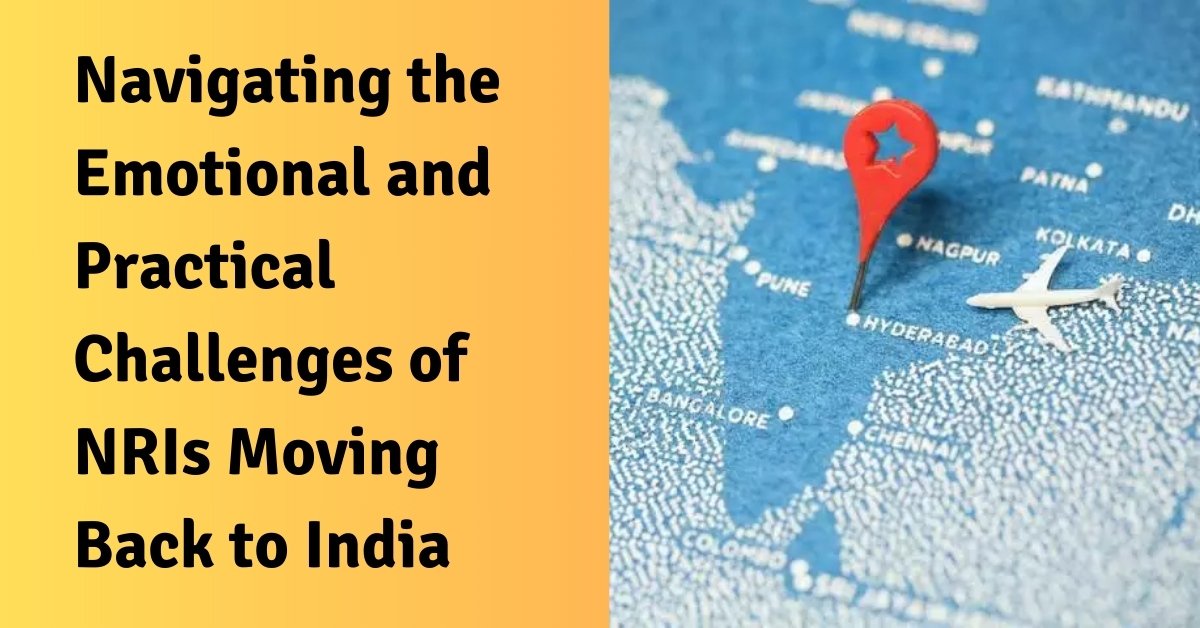Top 10 Things NRIs Miss About Living Abroad and How to Cope?
As Non-Resident Indians (NRIs) settle into life abroad, they often find themselves yearning for aspects of their homeland. While the expatriate experience offers numerous opportunities for growth and cultural enrichment, it’s natural to feel a sense of nostalgia for what’s been left behind. This article explores the top ten things NRIs typically miss about living abroad and provides practical strategies for coping with these feelings. 1. Family and Close Friends The absence of immediate family and longtime friends is perhaps the most significant challenge for NRIs. The warmth of familiar relationships and the support system built over years can be sorely missed. Coping strategies: – Leverage technology for regular video calls and virtual gatherings – Plan annual trips to India or invite family members to visit – Join local Indian communities to form new connections 2. Festivals and Cultural Celebrations The vibrant atmosphere of Indian festivals, with their unique traditions and communal spirit, is often difficult to replicate abroad. Coping strategies: – Participate in local Indian community events celebrating major festivals – Organize small gatherings with fellow NRIs to observe traditions – Introduce Indian festivals to non-Indian friends and colleagues 3. Authentic Indian Cuisine While many countries offer Indian restaurants, the authentic flavors and variety of home-cooked Indian meals are often missed. Coping strategies: – Learn to cook favorite dishes from family recipes – Explore local Indian grocery stores for ingredients – Host potluck dinners with other NRIs to share regional specialties 4. Climate and Natural Surroundings The familiar climate, landscapes, and natural beauty of one’s hometown or region in India can be missed, especially in countries with vastly different environments. Coping strategies: – Decorate living spaces with images of Indian landscapes – Visit local parks or natural areas that may resemble Indian settings – Plan vacations to destinations with similar climates to India 5. Language and Colloquialisms The comfort of speaking in one’s mother tongue and using familiar expressions is often missed in foreign environments. Coping strategies: – Join language meetup groups to converse in Indian languages – Consume Indian media (movies, TV shows, podcasts) regularly – Teach Indian languages to children or interested friends 6. Street Food and Local Delicacies The unique flavors and variety of Indian street food and regional specialties are often irreplaceable abroad. Coping strategies: – Experiment with recreating street food dishes at home – Seek out authentic Indian eateries in your area – Stock up on Indian snacks and treats during visits home 7. Religious Practices and Spiritual Atmosphere The ease of accessing temples, participating in religious events, and experiencing the spiritual ambiance can be missed by NRIs. Coping strategies: – Create a dedicated space for prayer or meditation at home – Connect with local religious communities or institutions – Explore online resources for spiritual guidance and virtual temple visits 8. Entertainment and Media Bollywood movies, Indian television shows, and local entertainment options can be less accessible abroad. Coping strategies: – Subscribe to streaming services offering Indian content – Attend Indian film festivals or cultural events in your area – Stay updated with Indian entertainment news through online platforms 9. Lifestyle and Daily Routines The familiar rhythm of daily life in India, including household help, extended family support, and social norms, can be missed. Coping strategies: – Gradually adapt to new routines while incorporating elements of Indian lifestyle – Connect with other NRIs to share experiences and coping mechanisms – Embrace the positive aspects of the new lifestyle while preserving cultural values 10. Professional Networks and Career Opportunities Established professional connections and understanding of the job market in India can be missed when navigating a foreign work environment. Coping strategies: – Join professional associations for NRIs in your field – Attend networking events to build new connections – Leverage online platforms to maintain ties with Indian professional networks While living abroad offers numerous advantages, it’s natural for NRIs to experience moments of homesickness and nostalgia. By implementing these coping strategies and maintaining a positive outlook, NRIs can create a fulfilling life that balances the best of both worlds. FAQs: 1. How can I stay connected with my family in India while living abroad? Answer: Utilize video calling apps, schedule regular virtual family gatherings, and use messaging apps for daily communication. 2. What are some ways to celebrate Indian festivals abroad? Answer: Join local Indian community events, organize small gatherings with fellow NRIs, or host virtual celebrations with family back home. 3. How can I find authentic Indian ingredients for cooking abroad? Answer: Look for Indian grocery stores in your area, explore online retailers that ship internationally, or ask visiting family members to bring specific items. 4. Are there ways to continue religious practices while living in a foreign country? Answer: Create a prayer space at home, connect with local religious communities, and use online resources for spiritual guidance. 5. How can I help my children maintain their connection to Indian culture? Answer: Teach them the language, celebrate festivals, expose them to Indian music and movies, and consider enrolling them in cultural classes if available. 6. What are some strategies for dealing with homesickness? Answer: Stay connected with loved ones, participate in Indian community events, create familiar environments at home, and focus on the positive aspects of your new life. 7. How can I build a professional network as an NRI? Answer: Join professional associations, attend networking events, and use online platforms like LinkedIn to connect with both local and Indian professionals. 8. Are there resources available for NRIs to stay updated on Indian news and current events? Answer: Subscribe to Indian news websites, use news apps, and follow reputable Indian media outlets on social media platforms. 9. How can I maintain my Indian citizenship while living abroad? Answer: Understand the rules regarding Overseas Citizenship of India (OCI) or Person of Indian Origin (PIO) cards, and consult with the Indian embassy in your country of residence for specific guidelines. 10. What financial considerations should NRIs keep in mind? Answer: Be aware of tax implications
Cultural Re-adjustment: Tips for NRIs Moving Back to India
Moving back to India after living abroad can be an exciting yet challenging experience for Non-Resident Indians (NRIs). While returning to your roots can be comforting, it also comes with its own set of cultural adjustments. This guide aims to help you navigate the transition smoothly and embrace the changes that come with relocating back to India. Prepare Mentally Before you pack your bags, it’s important to prepare yourself mentally for the move: • Set realistic expectations: Remember that India may have changed since you left. Be open to new experiences and avoid comparing everything to your life abroad. • Stay positive: Focus on the benefits of moving back, such as reconnecting with family and immersing yourself in your cultural heritage. • Be patient: Adjustment takes time. Give yourself permission to feel frustrated or homesick occasionally. Reconnect with Indian Culture Easing back into Indian culture can help smooth your transition: • Read Indian news: Start following Indian news sources to stay updated on current events and trends. • Watch Indian movies and TV shows: This can help you catch up on popular culture and current language usage. • Listen to Indian music: Familiarize yourself with the latest Bollywood hits or rediscover classical tunes. Adapt to Daily Life Daily life in India may be quite different from what you’re used to. Here are some tips to help you adjust: • Traffic and commuting: Be prepared for busy roads and different traffic rules. Consider using ride-sharing apps or hiring a driver initially. • Shopping habits: Familiarize yourself with local markets and online shopping platforms popular in India. • Domestic help: If you plan to hire household help, learn about the current norms for wages and working conditions. • Power and internet: Be prepared for occasional power cuts and internet disruptions. Consider investing in a backup power supply and a reliable internet connection. Navigate Social Norms Social interactions in India may differ from what you’ve experienced abroad: • Greetings: Reacquaint yourself with traditional Indian greetings like “Namaste” or “Namaskar.” • Personal space: Be prepared for less personal space in public areas compared to many Western countries. • Dress code: While urban areas are more relaxed, it’s good to be aware of appropriate dress for different occasions. • Time management: Adjust to the more fluid concept of time in social situations, often referred to as “Indian Standard Time.” Manage Family Expectations Returning to live closer to family can be wonderful but may also come with challenges: • Set boundaries: Clearly communicate your need for personal space and time. • Balance traditions and personal choices: Find a middle ground between family expectations and your own lifestyle preferences. • Involve family gradually: Ease into family routines and traditions rather than diving in all at once. Handle Professional Transitions If you’re planning to work in India, prepare for some differences in work culture: • Networking: Leverage your international experience while building local professional networks. • Work style: Be prepared for potential differences in communication styles, meeting structures, and decision-making processes. • Skill adaptation: Some of your skills may need to be adapted to the Indian market. Stay open to learning and adjusting. Deal with Reverse Culture Shock Reverse culture shock is real and can be challenging. Here’s how to cope: • Acknowledge your feelings: It’s normal to feel out of place initially. Accept these feelings as part of the process. • Find a support system: Connect with other returning NRIs who can relate to your experiences. • Maintain connections: Keep in touch with friends from abroad to maintain a sense of continuity. • Seek professional help: If you’re struggling to adjust, don’t hesitate to consult a mental health professional. Embrace the Positives While focusing on adjustments, don’t forget to enjoy the positives of being back in India: • Family time: Cherish the opportunity to spend more time with family and old friends. • Cultural immersion: Enjoy festivals, traditions, and cultural events that you might have missed while abroad. • Food: Relish the variety and flavors of Indian cuisine that you may not have had easy access to overseas. • Career opportunities: Explore the growing job market and entrepreneurial opportunities in India. Stay Connected to Your International Experience While adapting to life in India, don’t completely disconnect from your international experience: • Keep language skills sharp: Continue practicing any foreign languages you’ve learned. • Stay globally informed: Keep up with international news and maintain a global perspective. • Share your experiences: Your international exposure is valuable. Share your experiences and insights when appropriate. Conclusion Moving back to India as an NRI is a significant life change that requires patience, flexibility, and a positive attitude. While there will be challenges, the experience can also be incredibly rewarding. Embrace the journey of rediscovering your roots while bringing your global perspective to your life in India. Remember, everyone’s experience is unique. What works for one person may not work for another. Be kind to yourself as you navigate this transition, and don’t hesitate to seek support when needed. With time and effort, you’ll find your own balance between your international experiences and your new life in India. Disclaimer: The information provided here is for educational and informational purposes only and should not be construed as financial, legal, or tax advice. Consult with a qualified professional before making any investment decisions. We do not accept any liability for errors or omissions in this information nor any direct, indirect, or consequential losses arising from its use.
How to Maintain International Connections After Returning to India?
As Non-Resident Indians (NRIs) return to their homeland, they often face the challenge of maintaining the valuable international connections they’ve cultivated during their time abroad. These connections, both personal and professional, can be crucial for future opportunities, cultural exchange, and personal growth. In this guide, we’ll explore effective strategies for NRIs to keep their global network alive and thriving after settling back in India. 1. Leverage Digital Platforms In today’s interconnected world, technology serves as a bridge across continents. Make the most of digital platforms to stay in touch with your international contacts: a) Professional Networking: – LinkedIn: Update your profile to reflect your move back to India and stay active by sharing industry insights and engaging with your connections’ posts. – Industry-specific platforms: Participate in forums and discussions relevant to your field. b) Social Media: – Facebook, Instagram, and Twitter: Share updates about your life in India and interact with friends’ posts to maintain personal connections. – WhatsApp groups: Create or join groups with former colleagues or friends from your time abroad. c) Video Conferencing: – Schedule regular video calls with close friends and important professional contacts using platforms like Zoom, Skype, or Google Meet. 2. Attend International Events and Conferences Participating in global events can help you stay connected to the international community: a) Industry conferences: Attend international conferences in your field, either virtually or in person when possible. b) Alumni events: Participate in reunions or networking events organized by your alma mater. c) Cultural festivals: Engage in international cultural events hosted in India to meet expats and globally-minded individuals. 3. Join Professional Associations Maintain your membership in international professional associations: a) Participate in webinars and online workshops. b) Contribute articles to association publications. c) Volunteer for committees or leadership roles that allow you to interact with international members. 4. Offer Your Expertise Position yourself as a valuable resource for your international network: a) Write articles or blog posts about doing business in India or your industry’s landscape in the country. b) Offer to be a local point of contact for international colleagues or companies looking to expand into India. c) Provide mentorship to students or young professionals in your former host country who are interested in Indian markets or culture. 5. Plan Regular International Trips While it may not be feasible to travel frequently, planning regular international trips can help maintain face-to-face connections: a) Combine business trips with personal visits to former colleagues and friends. b) Attend destination weddings or significant life events of close international friends. c) Plan family vacations to countries where you have strong connections. 6. Host International Visitors Invite your international contacts to visit you in India: a) Offer to show them around your city or region. b) Introduce them to Indian culture and cuisine. c) Arrange meetings with local professionals in their field of interest. 7. Engage in Cross-Cultural Projects Initiate or participate in projects that involve collaboration between India and other countries: a) Research partnerships between Indian and international institutions. b) Cross-border business ventures or consultancy work. c) Cultural exchange programs or language tandems. 8. Stay Informed About Global Affairs Keep yourself updated on international news and trends: a) Subscribe to international news outlets and industry publications. b) Follow thought leaders and influencers from different countries on social media. c) Participate in online discussions about global issues. 9. Maintain Language Skills If you’ve acquired language skills during your time abroad, make efforts to maintain them: a) Read books or watch movies in the foreign language. b) Find language exchange partners online or in your local community. c) Consider teaching the language part-time to stay connected with the culture. 10. Cultivate a Global Mindset at Home Create an environment that nurtures your international connections: a) Celebrate international holidays and traditions. b) Cook international cuisines and invite local friends to experience them. c) Encourage your children to learn about different cultures and possibly learn a foreign language. 11. Engage in International Volunteer Work Participate in volunteer activities with a global focus: a) Join international NGOs operating in India. b) Contribute to global online volunteer platforms. c) Mentor international students studying in India. 12. Utilize Alumni Networks Leverage your alma mater’s alumni network: a) Attend local alumni chapter meetings in India. b) Participate in global alumni webinars or online events. c) Offer to organize alumni meetups in your city for visiting international alumni. Conclusion Returning to India doesn’t mean severing your international ties. With conscious effort and strategic use of available resources, you can maintain and even strengthen your global connections. These relationships not only enrich your personal life but can also open doors to exciting opportunities in an increasingly interconnected world. Remember, maintaining international connections is a two-way street. While you’re making efforts to stay in touch, also be responsive when your international contacts reach out to you. Share your knowledge about India, offer assistance when possible, and be a bridge between your international network and your local community in India. By following these strategies, you’ll be well-equipped to preserve your global network, continue benefiting from diverse perspectives, and potentially create new opportunities that span borders. Your international experience is a valuable asset – nurturing these connections ensures that it continue to add value to your personal and professional life long after you’ve settled back in India. Disclaimer: The information provided here is for educational and informational purposes only and should not be construed as financial, legal, or tax advice. Consult with a qualified professional before making any investment decisions. We do not accept any liability for errors or omissions in this information nor any direct, indirect, or consequential losses arising from its use.
Navigating the Emotional and Practical Challenges of NRIs Moving Back to India
Imagine the vibrant rush of colors at a traditional Indian festival, the delightful aroma of street food wafting through bustling lanes, and the comforting embrace of familiar faces after years away. The thought of moving back to India might stir up a flood of warm memories and a sense of longing for home. However, behind this excitement lies a more intricate and challenging journey. Relocating back to India from abroad is not just about revisiting old haunts or indulging in nostalgia. It’s a complex transition that encompasses emotional, cultural, and practical challenges. Understanding and preparing for these challenges can make your return smoother and more fulfilling. Non-Resident Indians (NRIs) face a range of challenges when deciding to return to India after years abroad. While the excitement of returning home to family and familiar surroundings can be overwhelming, the transition also involves significant emotional and practical adjustments. This guide explores the emotional journey of reverse culture shock and provides practical strategies for managing this transition effectively, including a detailed checklist for a smooth return to India. Understanding Reverse Culture Shock Reverse culture shock occurs when expatriates experience difficulties adjusting to their home country’s culture after being accustomed to a different one abroad. This adjustment can often be more intense than the initial culture shock encountered when moving abroad. Key Aspects of Reverse Culture Shock: Aspect Description Alienation Feeling out of place in your own culture. Frustration Irritation with customs and norms that were once familiar. Boredom Missing the excitement of expatriate life. Identity Crisis Struggling with changes in self-identity and perceptions. Unexpected Changes Discovering that both you and your home country have evolved during your absence. Emotional Implications The emotional impact of returning home can be varied, including: Practical Challenges of Moving Back to India 1. Culture Shock Even though India is your home, the return may bring unexpected culture shock due to changes in the environment and lifestyle. Solution: Before you return, mentally prepare for the changes. Recognize that both you and your home environment have evolved. Research current events, cultural trends, and social norms to better understand what to expect. Take it slow. Adjust gradually to the local environment and understand that settling in will take time. 2. Career Opportunities Finding the right job can be challenging due to a competitive job market and the need to adapt your international experience. Solution: Start your job search before you move. Network with industry professionals, use job portals, and be patient in your search. Use this transition as an opportunity for personal development. Explore new interests or revisit old hobbies. 3. Education System Adjustment The Indian education system can be quite different from what your children are used to. Solution: Research schools and consider international options if they align with your child’s past education. Help your children navigate the academic pressures. 4. Bureaucracy You might face bureaucratic hurdles with property matters and other legal processes. Solution: Hire a reputable legal advisor to guide you through Indian legal procedures and ensure all documentation is complete. 5. Lifestyle Changes Adapting from the comforts of living abroad to a different lifestyle in India can be challenging. Solution: Reintegrate Gradually.Don’t rush into everything at once. Take your time to readjust to your surroundings and experiences. Be open to experiencing changes in your culture to reduce frustration and alienation. Embrace the change by discovering new hobbies and enjoying the rich cultural heritage of India. Participate in community events and cultural activities to rekindle your sense of belonging. 6. Healthcare Quality Concerns about healthcare quality and infrastructure are common among returning NRIs. Solution: Research healthcare facilities and choose a good insurance plan to ensure you have access to quality medical care. 7. Emotional Challenges Adjusting to the new environment and the emotions of moving back can be intense. Solution: Maintain connections with friends abroad and seek local support systems. Reconnect with friends and family in India to build a new support network. Consider consulting a mental health professional to help manage stress and other emotional challenges. Document your experiences to help process the transition and reflect on your growth. Engage in activities that bring you joy and manage your expectations. A must-have checklist for NRIs returning to India 1. Financial Planning and Management Task Details Convert Bank Accounts Change your NRE/FCNR accounts to resident accounts or open an RFC (Resident Foreign Currency) account. Notify your foreign bank about your status change. Tax Planning Get acquainted with Indian tax laws and understand the implications for returning NRIs. Consider consulting a tax advisor. Review Investments Assess and update your investment portfolio. Determine the status of your foreign investments and explore new opportunities in India. Insurance Needs Evaluate your insurance requirements in India. Look into health, life, and property insurance options that suit your needs. Currency Exchange Understand the best practices for currency exchange to minimize costs and maximize value. 2. Legal Formalities and Compliance Task Details Visa and Immigration Secure appropriate visas or OCI (Overseas Citizen of India) cards for family members who are not Indian citizens. Property Decisions Decide the fate of your overseas property. Consider selling, renting, or retaining it, and if renting, hire a reliable property management company. Driver’s License Obtain an Indian driver’s license. Note that an international license is valid for one year, but acquiring an Indian license promptly is advisable. Document Authentication Ensure all important documents are authenticated and ready for any legal requirements in India. 3. Career and Professional Development Task Details Job Hunting Initiate your job search before moving. Network with industry professionals in India and utilize job portals. Business Setup If starting a business, research the market, understand the legalities, and create a robust business plan. Skills Update Consider upskilling or acquiring new certifications relevant to the Indian job market. Professional Networks Join industry associations and professional networks to ease your transition into the Indian professional environment. 4. Educational Planning for Family Task Details School Research Investigate schools and understand their admission processes. Begin applications early to align with





